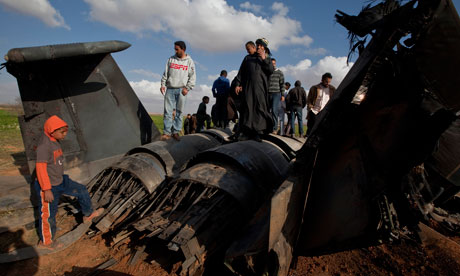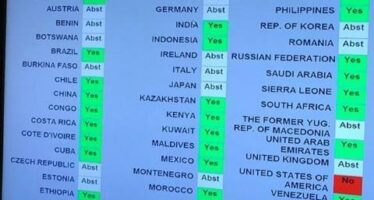Nato to take control in Libya after US, UK and France reach agreement
![]()
Nato to assume day-to-day military command in Libya
Nicholas Watt, Nick Hopkins and Ian Traynor in Brussels
Libyans look on at a crashed US plane. Photograph: Sean Smith for the Guardian
Barack Obama agreed in separate phone calls with Sarkozy and David Cameron that political oversight would be handed to a separate body made up of members of the coalition, including Arab countries such as Qatar and the United Arab Emirates, which are outside Nato.
The agreement, which will have to be put be to all 28 members of Nato, indicates the alliance is on course to resolve one of its most serious disagreements. The alliance had been starting to splinter as it tried to comply with Obama’s demand that Washington be quickly relieved of command of the air campaign.
The Libyan leader Muammar Gaddafi criticised the air strikes which he said breached the UN charter and were “by a bunch of fascists”. In a televised address he promised victory over the coalition: “In the short term, we’ll beat them, in the long term, we’ll beat them.”
Sarkozy moved to portray the agreement as a Franco-American success. In a statement, the Élysée Palace said: “The two presidents have come to an agreement on the way to use the command structures of Nato to support the coalition.” But the agreement represents a blow for Sarkozy, who had tried to persuade Britain to set up an Anglo-French command for all military operations in Libya. That idea was strongly resisted by Britain which said Nato was best placed to run the military operations.
Obama, who spoke to Cameron and Sarkozy in separate phone calls during his tour of Latin America, agreed that:
• Nato will assume the day-to-day military command of the no-fly zone, using the alliance’s military structures. The operation could be run by Admiral James Stavridis, the US supreme allied commander in Europe, who works from the Nato’s military headquarters in Mons, Belgium.
• Political oversight will be provided by members of the coalition and not by Nato. Sarkozy will say this shows Nato is not in complete command, as it was in the bombing campaign against Serbian targets during the 1999 Kosovo campaign. In a traditional Nato-led operation, political control would be provided by the North Atlantic Council, the main political decision-making body of the alliance.
The plan will be put to the council on Wednesday, which will hold its third meeting in as many days at ambassadorial level. All 28 members of Nato will have to agree on the proposal. Downing Street adopted a more cautious approach than the Élysée when it confirmed that Cameron and Obama had agreed that Nato should play a key role. A spokesman said: “The prime minister and the president agreed that good progress had been made in Nato on command and control of military operations, that Nato should play a key role in the command structure going forward, and that these arrangements now needed to be finalised.”
Diplomatic sources said progress on the new structures emerged as France and Turkey started to give ground. France softened its stance after Britain and the US agreed that the international coalition would have political oversight but that Nato would have to assume military control. London and Washington were supported by newer members of Nato, such as Romania and the Czech Republic, who said they could only support the campaign if it was run by Nato.
A phone call between Obama and the Turkish prime minister Tayyip Recep Erdogan led to what was described as a more pragmatic approach. “Turkey has become more flexible in the last day or so,” one diplomat said. Turkey, the third largest member of Nato, and which has a predominantly Muslim population, had highlighted tensions within the alliance when it launched a strong attack on France. Sarkozy had tried to reach out to the Muslim world by playing down Nato’s role in Libya.
Egemen Bagis, Turkey’s Europe minister, accused the French president of exploiting Libya for his own electoral needs. Sarkozy has been the biggest opponent of Ankara’s ambitions to join the European Union. “A European leader began his election campaign by organising a meeting that led to a process of air strikes against Libya. He acted before a Nato decision, and his act was based on his subjective evaluation of a UN resolution,” said Bagis.
The agreement came as William Hague, the foreign secretary, declared that the Arab spring is likely to be more significant than 9/11. Hague told the Times CEO Summit Africa: “We are only in the early stages of what is happening in north Africa and the Middle East. It is already set to overtake the 2008 financial crisis and 9/11 as the most important development of the early 21st century, and is likely to bring some degree of political change in all countries in the Arab world.””This is a historic shift of massive importance, presenting the international community as a whole with an immense opportunity. We believe that the international response to these events must be commensurately generous, bold and ambitious.”
The foreign secretary added that the international action against Libya – and the demands for freedom – meant that Robert Mugabe and other authoritarian leaders in Africa would eventually face justice. Hague said: “Governments that use violence to stop democratic development will not earn themselves respite forever. They will pay an increasingly high price for actions which they can no longer hide from the world with ease, and will find themselves on the wrong side of history. Governments that block the aspirations of their people, that steal or are corrupt, that oppress and torture or that deny freedom of expression and human rights should bear in mind that they will find it increasingly hard to escape the judgment of their own people, or where warranted, the reach of international law. The action we have taken in Libya, authorised by the United Nations Security Council, shows that the international community does take gross violations of human rights extremely seriously.”
The agreement on the military command of the no-fly zone came as key military British figures expressed dismay at No 10’s handling of the conflict, suggesting the prime minister’s office is subverting commanders conducting the operation. Officials resent the way No 10 appeared to undermine General Sir David Richards, the country’s most senior military officer, who rejected ministers’ claims that Gaddafi might be a legitimate target. Sources said that by identifying Gaddafi as a target, Britain laid itself open to the charge that “if you kill him, it was premeditated, and if you don’t, you have failed”.
Additional reporting by Richard Norton-Taylor and Simon Tisdall
Related Articles
Amnesty says Arab uprising ‘on knife edge’
![]()
The struggle for freedom has entered a decisive phase as brutal Arab regimes try to regain control, rights group says
Informe de Comisión de Investigación sobre última ofensiva de Israel en Gaza del 2014
![]()
Desde el pasado 22 de junio, está disponible el informe de la Comisión Independiente, creada por el Consejo de Derechos Humanos de las Naciones Unidas en julio del 2014, sobre la última ofensiva israelí en Gaza
Los ‘rolezinhos’ reivindican su protagonismo social tomando los centros comerciales
![]()
BRASIL, Sao Paulo. Protestas ciudadanas contra la ilegalización de los ‘rolezinhos’.AFP/Nelson ALMEIDA El desalojo policial de miles de participantes en



